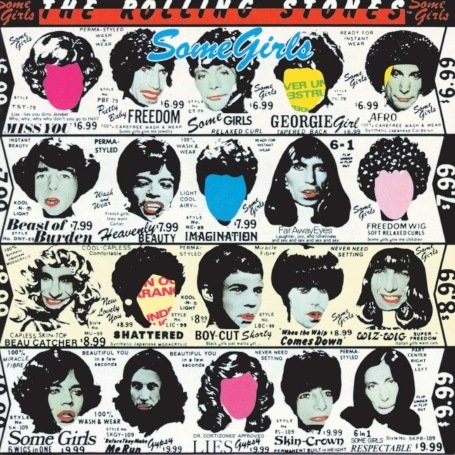
Some Girls (1978)

1.Miss You
2.When The Whip Comes Down
3.Just My Imagination (Runnin' Away With Me)
4.Some Girls
5.Lies
6.Far Away Eyes
7.Respectable
8.Before They Make Me Run
9.Beast of Burden
10.Shattered
Often cited as the final “classic” Rolling Stones record, Some Girls defied both commercial expectations and critical cynicism upon its release in 1978. That it emerged during an era when many veteran rock groups faltered—struggling to absorb punk and disco trends without surrendering their identity—makes its success all the more remarkable. While others stumbled attempting to sound “contemporary,” the Stones filtered those new styles through their own unmistakable aesthetic and, rather astonishingly, came out with one of their strongest efforts.
By now, Ron Wood had been fully integrated into the band—not merely as a session hand or touring adjunct, but as a bona fide member—and his presence permeates the record. Unlike Black and Blue, where his participation was still tentative, Some Girls is a full-band effort, muscular and assured from start to finish.
Much has been made of the album’s flirtation with dance music, but the disco label is misleading. While Miss You is undeniably built on a dance groove, to reduce it to genre pastiche is to overlook its remarkable construction. The falsetto chorus, shared by Jagger, Richards, and Wood, is among the most iconic in rock history, and the song’s rhythmic sophistication places it far beyond novelty. It was a masterstroke—and a massive hit.
But after that, the Stones return—resolutely and unapologetically—to themselves. When the Whip Comes Down is savage, gleefully nihilistic, and gloriously unfiltered. The title track, Some Girls, lurches between provocation and outright offensiveness, its lyrics skirting so close to the edge that they sparked protests at the time, most notably from Jesse Jackson. It would never see the light of day in today’s political climate. And yet, it’s all undeniably part of the fabric: this was the Stones at their most brash, sneering, and sharp-edged.
Elsewhere, they borrow from punk with Shattered, whose staccato vocal delivery and disorienting structure bear the clear mark of the era—though, crucially, the band’s personality is never subsumed by the influence. As always, they absorb the style and recast it entirely in their own image.
There is even humour here, in the form of Faraway Eyes, a faux-country track that somehow manages to be simultaneously affectionate and absurd. Their country pastiches had long been a feature of their albums—sometimes serious, sometimes satirical—and this may be their finest in the latter category, complete with Jagger’s deadpan delivery.
Not to be overlooked is their cover of The Temptations’ Just My Imagination (Running Away with Me), a soul standard reworked into a gently rolling rock ballad. Rather than slavishly imitate the original, they recast it entirely, transforming it into a Stones song in every sense. It’s a triumph.
Starting here, Keith Richards would take a vocal lead on nearly every album. Before They Make Me Run inaugurates that tradition. Ironic, perhaps, given that Richards had long been the voice of orthodoxy in the band—the keeper of the flame. Yet his contributions always seem to veer slightly outside the Stones' core style. It hardly matters; the track works, and has since become a favourite.
Ultimately, Some Girls is one of those rare albums that arrives just when the band’s cultural relevance seems to be slipping, only to blow away all such assumptions. That it came this late in the game only deepens its impact. After so many years—and so many presumed endings—this was proof that the Stones could still astonish.
Go back to the main page
Go To Next Review